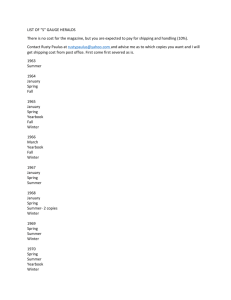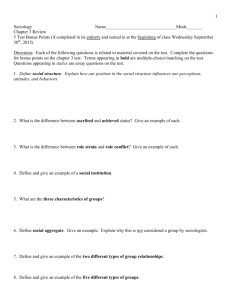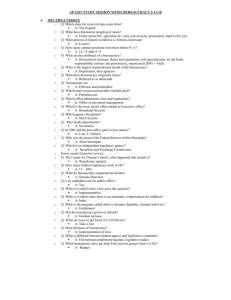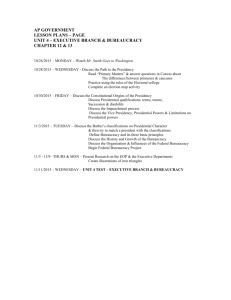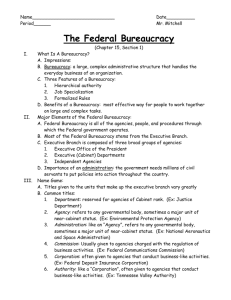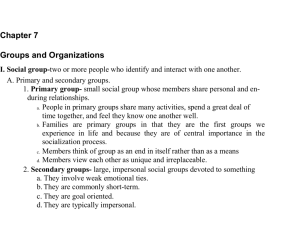GOVT 851 - Office of the Provost
advertisement
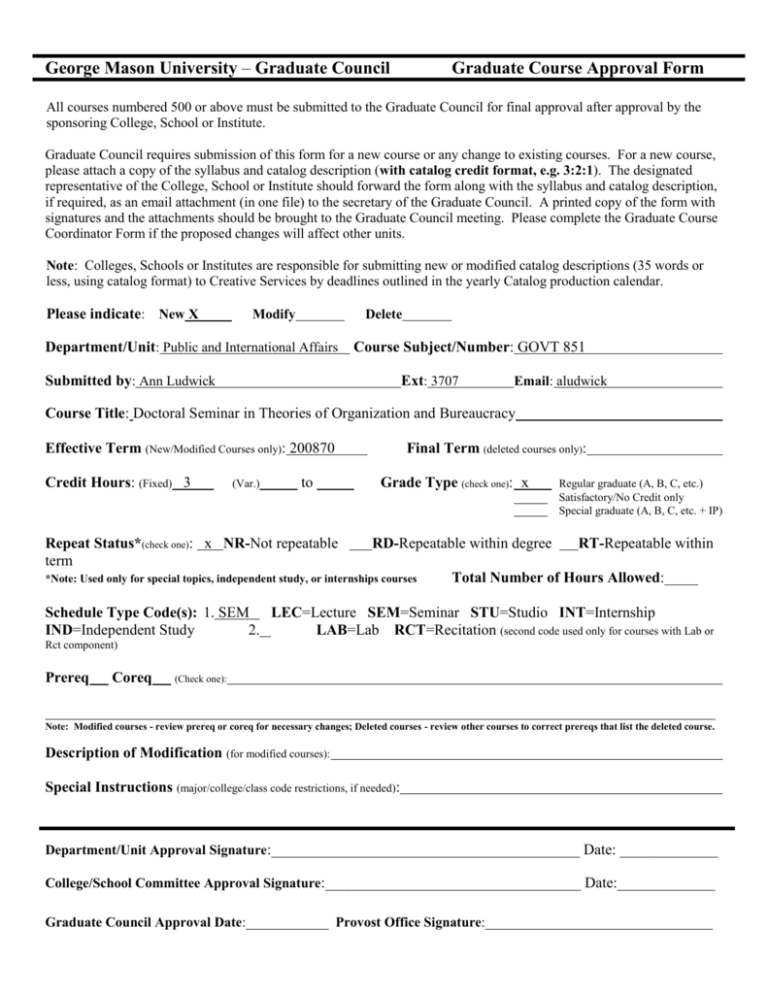
George Mason University – Graduate Council Graduate Course Approval Form All courses numbered 500 or above must be submitted to the Graduate Council for final approval after approval by the sponsoring College, School or Institute. Graduate Council requires submission of this form for a new course or any change to existing courses. For a new course, please attach a copy of the syllabus and catalog description (with catalog credit format, e.g. 3:2:1). The designated representative of the College, School or Institute should forward the form along with the syllabus and catalog description, if required, as an email attachment (in one file) to the secretary of the Graduate Council. A printed copy of the form with signatures and the attachments should be brought to the Graduate Council meeting. Please complete the Graduate Course Coordinator Form if the proposed changes will affect other units. Note: Colleges, Schools or Institutes are responsible for submitting new or modified catalog descriptions (35 words or less, using catalog format) to Creative Services by deadlines outlined in the yearly Catalog production calendar. Please indicate: New X Modify Delete Department/Unit: Public and International Affairs Course Subject/Number: GOVT 851 Submitted by: Ann Ludwick Ext: 3707 Email: aludwick Course Title: Doctoral Seminar in Theories of Organization and Bureaucracy Effective Term (New/Modified Courses only): 200870 Credit Hours: (Fixed) 3 (Var.) to Repeat Status*(check one): x NR-Not repeatable term Final Term (deleted courses only): Grade Type (check one): x RD-Repeatable within degree *Note: Used only for special topics, independent study, or internships courses Regular graduate (A, B, C, etc.) Satisfactory/No Credit only Special graduate (A, B, C, etc. + IP) RT-Repeatable within Total Number of Hours Allowed: Schedule Type Code(s): 1. SEM LEC=Lecture SEM=Seminar STU=Studio INT=Internship IND=Independent Study 2. LAB=Lab RCT=Recitation (second code used only for courses with Lab or Rct component) Prereq Coreq (Check one): _________________________________________________________________________________________ Note: Modified courses - review prereq or coreq for necessary changes; Deleted courses - review other courses to correct prereqs that list the deleted course. Description of Modification (for modified courses): Special Instructions (major/college/class code restrictions, if needed): Department/Unit Approval Signature:_________________________________________ Date: _____________ College/School Committee Approval Signature:__________________________________ Date:_____________ Graduate Council Approval Date:____________ Provost Office Signature:_________________________________ George Mason University Graduate Course Coordination Form None needed Approval from other units: Please list those units outside of your own who may be affected by this new, modified, or deleted course. Each of these units must approve this change prior to its being submitted to the Graduate Council for approval. Unit: Head of Unit’s Signature: Date: Unit: Head of Unit’s Signature: Date: Unit: Head of Unit’s Signature: Date: Unit: Head of Unit’s Signature: Date: Unit: Head of Units Signature: Date: Graduate Council approval: ______________________________________________ Date: ____________ Graduate Council representative: __________________________________________ Date: ____________ Provost Office representative: ____________________________________________ Date: ____________ GOVT 851 Seminar in Theories of Organization and Bureaucracy George Mason University This course is designed to explore significant developments and themes in the theory of public administration, especially American public administration. The seminar builds on more basic courses in public administration and is intended in part to assist students in preparation for doctoral preliminary examinations in public administration. Major foci in this seminar include the historical development of public administration as a body of thought and as a theory of politics; the enduring theme of public administration and democracy; various possible unifying themes, theories, and criteria; and prospects for the future. The course is aimed at encouraging advanced students to refine their abilities to identify, analyze, interpret, critique, evaluate, and contribute to the literature and intellectual developments of this field of scholarship, as well as to place current and emerging trends in broader context. Recommended Texts: Charles T. Goodsell, The Case for Bureaucracy: A Public Administration Polemic 4th ed. (Washington, DC: CQ Press, 2003) Laurence E. Lynn, Jr., Public Management Old and New (New York and London: Routledge, 2006) Kenneth J. Meier and Laurence J. O’Toole, Jr., Bureaucracy in a Democratic State: A Governance Perspective (Baltimore: Johns Hopkins University Press, 2006) Vincent Ostrom, The Intellectual Crisis in American Public Administration 2d ed. (University, Ala.: University of Alabama Press, 1989) Woodrow Wilson, “The Study of Administration,” Political Science Quarterly 2, 2 (June 1887): 197-222. B. Guy Peters, The Future of Governing, 2d ed. (2001) J. E. Jreisat, Comparative Public Administration (2002) Jay Shafritz, ed., Classics of Public Administration, 5th ed (2004) Requirements: Students will be expected to prepare several short papers and reviews for presentation to class in addition to a major research project. These projects will show that the student has gained an in-depth understanding of a particular public administration theory or of a particular theoretical debate in the field. 1) Students will write four journal review papers analyzing 4-6 academic journal articles on a contemporary approach to public administration theory. These papers will also be presented to the class by the student. The two journal review papers will reflect the thinking of the field within the past ten years. Each review should be 6-8 pages long. 2) Research Paper -- Each student will prepare a 25 page paper on a topic of interest to the student and with the approval of the professor. The purpose of this paper is to apply the readings and ideas used in class. For example, a student may apply these to an actual case study. In addition to compiling research materials on the organizational changes, the student should seek, where possible, to interview persons familiar with the process. Papers may focus on agencies and institutions at any level. Grades will be calculated as follows: . Journal Reviews – 10% each. Research Paper – 40%. Class Participation – 20 %. Schedule of Classes Week 1 – Introduction and Orientation to Class Peters – Chapter 1 (Handout) - Stillman, Preface to Public Administration: A Search for Themes and Directions - Chapter 1. Week 2 Legal, Political Theory and historical Influences in American Public Administration Articles: David Rosenbloom. "Public Administration Theory and the Separation of Powers". Public Administration Review (1983) Gabriel Almond, Eric A. Nordlinger, Theodore Lowi, and Sergio Fabbrini, "The Return to the State: Critique," American Political Science Review 82, 3 (September 1988): 867-901 James G. March and Johan P. Olsen, "The New Institutionalism: Organizational Factors in Political Life," American Political Science Review 78, 3 (September 1984): 734-49 Jos C.N. Raadschelders, “Administrative History of the United States: Development and State of the Art,” Administration and Society 32, 5 (November 2000): 499-528 James A. Stever, "The Dual Image of the Administrator in Progressive Administrative Theory," Administration and Society 22, 1 (May 1990): 39-57; Laurence J. O'Toole, Jr., "Legitimacy, Legitimation, and Public Administration: Rejoinder to Stever," Administration and Society 22, 1 (May 1990): 58-65 Richard J. Stillman II, "American or European Public Administration: Does Public Administration Make the Modern State, or Does the State Make Public Administration?" Public Administration Review 57, 4 (July/August 1997): 332-38 Internet/Online Readings: Federalist Papers 10, 51, 73. Week 3 Public Bureaucracies and Democracy Lisa Blomgren Bingham, Tina Nabachi, and Rosemary O’Leary, “The New Governance: Practices and Processes for Stakeholder and Citizen Participation in the Work of Government,” Public Administration Review 65, 5 (September 2005), pp. 54758 Richard D. Bingham and William M. Bowen, "`Mainstream' Public Administration Over Time: A Topical Content Analysis of Public Administration Review," Public Administration Review 54, 2 (March-April 1994): 204-208 Richard C. Box, Gary S. Marshall, B.J. Reed, and Christine M. Reed, “New Public Management and Substantive Democracy,” Public Administration Review 61, 5 (September-October 2001): 608-19 Harry C. Boyte, “Reframing Democracy: Governance, Civic Agency, and Politics,” Public Administration Review 65, 5 (September 2005), pp. 536-46 Richard F. Callahan, “Challenges of (Dis)Connectedness in the ‘Big Questions’ Methodologies in Public Administration,” Public Administration Review 61, 4 (JulyAugust 2001): 493-99 H. George Frederickson, "Toward a Theory of the Public for Public Administration," Administration and Society 22, 4 (February 1991): 395-417; Camilla Stivers, "Some Tensions in the Notion of `The Public as Citizen,'" Administration and Society 22, 4 (February 1991): 418-23 Chris Skelcher, “Does Democracy Matter? A Transatlantic Research Design on Democratic Performance and Special Purpose Governments,” Journal of Public Administration Research and Theory 17, 1 (January 2007): 61-76 Richard J. Stillman, "Woodrow Wilson and the Study of Administration: A New Look at an Old Essay," American Political Science Review 67, 2 (June 1973): 582-88 Dwight Waldo, "The Development of a Theory of Democratic Administration," American Political Science Review 46, 1 (March 1952): 81-103; and Herbert Simon, Dwight Waldo, American Political Science Review 46, 2 (June 1952): 494-503 Week 4 Efficiency and Administrative Science Evan Berman and XiaoHu Wang, “Performance Measurement in U.S. Counties: Capacity for Reform,” Public Administration Review 60, 5 (September-October 2000): 409-20 Gene A. Brewer and Sally Coleman Selden, “Why Elephants Gallop: Assessing and Predicting Organizational Performance in Federal Agencies,” Journal of Public Administration Research and Theory 10, 4 (October 2000): 685-711 Trevor L. Brown, Matthew Potoski, and David M. Van Slyke, “Managing Public Service Contracts: Aligning Values, Institutions, and Markets,” Public Administration Review 66, 3 (May-June 2006): 323-31 Jesse Burkhead and Patrick J. Hennigan, "Productivity Analysis: A Search for Definition and Order," Public Administration Review 38, 1 (January-February 1978): 34-40 Michael D. Cohen, James G. March, and Johan P. Olsen, "A Garbage Can Model of Organizational Choice," Administrative Science Quarterly 17, 1 (March 1972): 1-25 Robert A. Dahl, "The Science of Public Administration: Three Problems," Public Administration Review 7 (Winter 1947): 1-11; and Herbert A. Simon, "A Comment on `The Science of Public Administration,'" Public Administration Review 7 (Winter 1947): 200-203 Robert B. Denhardt, "Toward a Critical Theory of Public Organizations," Public Administration Review 41, 6 (November-December 1981): 628-35 Kenneth J. Meier and Lael R. Keiser, "Public Administration as a Science of the Artificial: A Methodology for Prescription," Public Administration Review 56, 5 (September/October 1996): 459-66 Christopher Pollitt, “Performance Management in Practice: A Comparative Study of Executive Agencies,” Journal of Public Administration Research and Theory 16, 1 (January 2006), pp. 25-44 James D. Thompson, "On Building an Administrative Science," Administrative Science Quarterly 1 (June 1956): 102-111 Weeks 5 - 6 Representativeness and Professionalism Joel D. Aberbach and Bert A. Rockman, "Mandates or Mandarins? Control and Discretion in the Modern Administrative State," Public Administration Review 48, 2 (March-April 1988): 606-612 Mohamad G. Alkadry and Leslie E. Tower, “Unequal Pay: The Role of Gender,” Public Administration Review 66, 6 (November-December 2006): 888-98 Linda Cohen Bell and Cindy Simon Rosenthal, “From Passive to Active Representation: The Case of Women Congressional Staff,” Journal of Public Administration Research and Theory 13, 1 (January 2003): 65-82 Beverly A. Cigler, "Public Administration and the Paradox of Professionalization," Public Administration Review 50, 6 (November-December 1990): 637-53 Raewyn Connell, “Glass Ceilings or Gendered Institutions? Mapping the Gender Regimes of Public Sector Worksites,” Public Administration Review 66, 6 (NovemberDecember 2006): 837-49 Brian J. Cook, "The Representative Function of Bureaucracy: Public Administration in Constitutive Perspective," Administration and Society 23, 4 (February 1992): 403-429 Julie Dolan, “Representative Bureaucracy in the Federal Executive: Gender and Spending Priorities,” Journal of Public Administration Research and Theory 12, 3 (July 2002): 353-75 Julie Dolan, “Gender Equity: Illusion or Reality for Women in the Federal Executive Service?” Public Administration Review 64, 3 (May-June 2004): 299-308 Carl J. Friedrich, "Public Policy and the Nature of Administrative Responsibility," Public Policy 1 (1940); and Herman Finer, "Administrative Responsibility in Democratic Government," Public Administration Review 1 (1941): 335-50 R. Sam Garrett, James A. Thurber, A. Lee Fritschler, and David H. Rosenbloom, “Assessing the Impact of Bureaucracy Bashing by Electoral Campaigns,” Public Administration Review 66, 2 (March-April 2006): 228-40 Vernon Greene, Sally Coleman Selden, and Gene Brewer, “Measuring Power and Presence: Bureaucratic Representation in the American States,” Journal of Public Administration Research and Theory 11, 3 (July 2001): 379-402 John J. Hindera, "Representative Bureaucracy: Further Evidence of Active Representation in the EEOC District Offices," Journal of Public Administration Research and Theory 3, 4 (October 1993): 415-29 Hong-Hai Lim, “Representative Bureaucracy: Rethinking Substantive Effects and Active Representation,” Public Administration Review 66, 2 (March-April 2006): 193204 Kenneth J. Meier, "Latinos and Representative Bureaucracy: Testing the Thompson and Henderson Hypotheses," Journal of Public Administration Research and Theory 3, 4 (October 1993): 393-414 Kenneth J. Meier and Lloyd G. Nigro, "Representative Bureaucracy and Policy Preferences: A Study in the Attitudes of Federal Executives," Public Administration Review 36, 4 (July-August 1976): 458-69 Katherine C. Naff and John Crum, “The President and Representative Bureaucracy: Rhetoric and Reality,” Public Administration Review 60, 2 (March-April 2000): 98-109 Weeks 7 - 8 Public Organization and Public Management Robert Agranoff and Michael McGuire, “American Federalism and the Search for Models of Management,” Public Administration Review 61, 6 (November-December 2001): 671-81 Chris Argyris, "The Individual and the Organization: Some Problems of Mutual Adjustment," Administrative Science Quarterly 2 (June 1957): 1-24 Chris Argyris, "Some Limits of Rational Man Organization Theory," Public Administration Review 33, 3 (May-June 1973): 253-67; Herbert A. Simon, "Organizational Man: Rational or Self Actualizing," Public Administration Review 33, 4 (July-August 1973): 346-53; Argyris, "Organizational Man: Rational and Self Actualizing," Public Administration Review 33, 4 (July-August 1973): 354-57; Frederick C. Thayer, "A Comment on the Argyris-Simon Debate," Public Administration Review 34, 2 (March-April 1974): 184-88; and Simon, "Response," Public Administration Review 34, 2 (March-April 1974): 188 Robert Behn, "Public Management: Should It Strive to be Art, Science, or Engineering?" Journal of Public Administration Research and Theory 6, 1 (January 1996): 91-123 Barry Bozeman and Stuart Bretschneider, "The `Publicness Puzzle' in Organization Theory: A Test of Alternative Explanations of Differences between Public and Private Organizations," Journal of Public Administration Research and Theory 4, 2 (April 1994): 197-223 David Coursey and Barry Bozeman, "Decision Making in Public and Private Organizations: A Test of Alternative Concepts of `Publicness,'" Public Administration Review 50, 5 (September-October 1990): 525-35 Sergio Fernandez and Hal G. Rainey, “Managing Successful Organizational Change in the Public Sector,” Public Administration Review 66, 2 (March-April 2006): 168-76 Martin Landau, "Multiorganizational Systems in Public Administration," Journal of Public Administration Research and Theory 1, 1 (January 1991): 5-18 Martin Landau and Russell Stout, "To Manage Is Not to Control: The Folly of Type II Errors," Public Administration Review 39, 2 (March-April 1979): 148-56 Todd R. LaPorte, "A State of the Field: Increasing Relative Ignorance," Journal of Public Administration Research and Theory 4, 1 (January 1994): 5-15 Laurence E. Lynn, Jr., Carolyn J. Heinrich, and Carolyn J. Hill, “Studying Governance and Public Management: Challenges and Prospects,” Journal of Public Administration Research and Theory 10, 2 (April 2000): 233-61 Sean T. Lyons, Linda E. Duxbury, and Christopher A. Higgins, “A Comparison of the Values and Commitment of Private Sector, Public Sector, and Parapublic Sector Employees,” Public Administration Review 66, 4 (July-August 2006): 605-18 Ronald C. Moe, “The Emerging Federal Quasi Government: Issues of Management and Accountability,” Public Administration Review 61, 3 (May-June 2001): 290-312 Chester A. Newland, "A Field of Strangers in Search of a Discipline: Separatism of Public Management Research from Public Administration," Public Administration Review 54, 5 (September-October 1994): 486-88 James Perry and Hal Rainey, "The Public-Private Distinction in Organizational Theory," Academy of Management Review 13 (April 1988): 182-201 Weeks 9 - 10 Reconsiderations of Constitutionalism and Legitimacy Thomas J. Catlaw, “Constitution as Executive Order: The Administrative State and the Political Ontology of ‘We the People,’” Administration & Society 37, 4 (September 2005), pp. 445-82 Martha Derthick, "American Federalism: Madison's `Middle Ground' in the 1980s," Public Administration Review 47, 1 (January-February 1987): 66-74 Daniel Feldman, et al., "Forum: Public Administration and the Constitution," Public Administration Review 53, 3 (May-June 1993): 237-67 James L. Garnett, "Operationalizing the Constitution via Administrative Reorganization: Oilcans, Trends, and Proverbs," Public Administration Review 47, 1 (January-February 1987): 35-44 Ferrel Heady, "American Constitutional and Administrative Systems in Comparative Perspective," Public Administration Review 47, 1 (January-February 1987): 9-16 Ronald C. Moe and Robert S. Gilmour, "Rediscovering Principles of Public Administration: The Neglected Foundation of Public Law," Public Administration Review 55, 2 (March/April 1995): 135-46 Laurence J. O'Toole, Jr., "Doctrines and Developments: Separation of Powers, the Politics-Administration Dichotomy, and the Rise of the Administrative State," Public Administration Review 47, 1 (January-February 1987): 17-25 William D. Richardson and Lloyd G. Nigro, "Administrative Ethics and Founding Thought: Constitutional Correctives, Honor, and Education," Public Administration Review 47, 5 (September-October 1987): 367-76 Fred W. Riggs, "Bureaucracy and the Constitution," Public Administration Review 54, 1 (January-February 1994): 65-72 David H. Rosenbloom, "Public Administrative Liability for Constitutional Torts, the Rehnquist Court, and Public Administration," Administration and Society 24, 2 (August 1992): 115-31 David H. Rosenbloom, “Retrofitting the Administrative State to the Constitution: Congress and the Judiciary’s Twentieth-Century Progress,” Public Administration Review 60, 1 (January-February 2000): 29-46 Weeks 11-12 Public Choice, Political Economy, and Market-Based Analyses George A. Boyne, “Bureaucratic Theory Meets Reality: Public Choice and Service Contracting in U.S. Local Government,” Public Administration Review 58, 6 (November-December 1998): 474-84 Barry Bozeman, “Public-Value Failure: When Efficient Markets May Not Do,” Public Administration Review 62, 2 (March-April 2002): 145-61 Julie Dolan, “The Budget-Minimizing Bureaucrat? Empirical Evidence for the Senior Executive Service,” Public Administration Review 62, 1 (January-February 2002): 4250 M. Shamsul Haque, "The Intellectual Crisis in Public Administration in the Current Epoch of Privatization," Administration and Society 27, 4 (February 1996) 510-536 David Lowery, “A Transactions Costs Model of Metropolitan Governance: Allocation versus Redistribution in Urban America,” Journal of Public Administration Research and Theory 10, 1 (January 2000): 49-78 Theodore J. Lowi and Herbert A. Simon, "Lowi and Simon on Political Science, Public Administration, Rationality, and Public Choice," Journal of Public Administration Research and Theory 2, 2 (April 1992): 105-112 William E. Lyons and David Lowery, "Governmental Fragmentation versus Consolidation: Five Public-Choice Myths about How to Create Informed, Involved, and Happy Citizens," Public Administration Review 49, 6 (November-December 1989): 533-43 Marguerite Schneider and Fariborz Damanpour, “Public Choice Economics and Public Pension Plan Funding,” Administration and Society 34, 1 (March 2002): 57-86 Richard J. Stillman, "Professor Ostrom's New Paradigm for American Public Administration -- Adequate or Antique?" Midwest Review of Public Administration 10 (December 1976): 179-92; Stillman, "Controversy in Public Administration -- A Reply to Professor Ostrom," Midwest Review of Public Administration 12 (March 1978): 4144 Shui Yan Tang, "Institutional Arrangements and the Management of Common-Pool Resources," Public Administration Review 51, 1 (January-February 1991): 42-51 Week 13 - The New Public Management Joel D. Aberbach and Tom Christensen, “Citizens and Consumers: An NPM Dilemma,” Public Management Review 7, 2 (June 2005), pp. 225-46 Peter Barberis, “The New Public Management and a New Accountability,” Public Administration 76 (1988): 445-54 Evelyn Z. Brodkin, “Bureaucracy Redux: Management Reformism and the Welfare State,” Journal of Public Administration Research and Theory 17, 1 (January 2007): 117 Jeffrey L. Brudney, F. Ted Hebert, and Deil S. Wright, “Reinventing Government in the American States: Measuring and Explaining Administrative Reform,” Public Administration Review 59, 1 (January-February 1999) Patrick Dunleavy, Helen Margetts, Simon Bastow, and Jane Tinkler, “New Public Management Is Dead – Long Live Digital-Era Governance,” Journal of Public Administration Research and Theory 16, 3 (July 2006): 467-94 Carolyn J. Hill and Laurence E. Lynn, Jr., “Is Hierarchical Governance in Decline? Evidence from Empirical Research,” Journal of Public Administration Research and Theory 15, 2 (April 2005), pp. 173-95 Christopher Hood and Guy Peters, “The Middle Aging of New Public Management: Into the Age of Paradox?” Journal of Public Administration Research and Theory 14, 3 (July 2004): 267-82 Johan P. Olsen, “Maybe It Is Time to Rediscover Bureaucracy,” Journal of Public Administration Research and Theory 16, 1 (January 2006): 1-24 Michael Spicer, “Public Administration, the History of Ideas, and the Reinventing Government Movement,” Public Administration Review 64, 3 (May-June 2004): 353-61 Week 14 – Future Analysis of Bureaucracy and Organization Guy B. Adams and Jay D. White, "Dissertation Research in Public Administration and Cognate Fields: An Assessment of Methods and Quality," Public Administration Review 54, 6 (November-December 1994): 565-76 Jonathan Bendor, "The Fields of Bureaucracy and Public Administration: Basic and Applied Research," Journal of Public Administration Research and Theory 4, 1 (January 1994): 27-39 Frances S. Berry, Ralph S. Brower, Sang Ok Choi, Wendy Xinfang Goa, HeeSoun Jang, Myungjung Kwon, and Jessica Word, “Three Traditions of Network Research: What the Public Management Research Agenda Can Learn from Other Research Communities,” Public Administration Review 64, 5 (September-October 2004): 539-52 Jeff Gill and Kenneth J. Meier, “Public Administration Research and Practice: A Methodological Manifesto,” Journal of Public Administration Research and Theory 10, 1 (January 2000): 157-199 Ferrel Heady, "Comparative and International Public Administration: Building Intellectual Bridges," Public Administration Review 58, 1 (January-February 1998): 3239 Laurence E. Lynn, Jr. and Patricia W. Ingraham, eds., “Governance and Public Management: A Symposium,” Journal of Policy Analysis and Management 23, 1 (Winter 2004): 3-96 College of Humanities and Social Sciences COURSE CATALOG COPY FORM For the revision of catalog copy for new or modified courses On this form please provide the entry that will be used in the Course Description section of the University Catalog. A. Subject code number, course title, and credit hours. For example: ENGL 101 Composition (3:3:0). In the catalog code (3:3:0), the first number indicates the total number of credits, the second number indicates the hours of lecture of seminar per week, and the third number indicates the hours of laboratory or studio per week. Subject code and number: GOVT 851 Title: Doctoral Seminar in Theories of Organization and Bureaucracy Credit code: (3:3:0) B. Prerequisites needed prior to registration in the course or co-requisites: None Prerequisites: Co-requisites: C. Description of the course as it will appear in the catalog. Consult the catalog for models. (Keep descriptions concise, use verb phrase not sentences, use present tense) Examines key issues in organization theory and behavior. Issues include organization design; interorganizational coordination, intelligence and decision-making systems; leadership and motivation theories; and theories or organizations as agents of political and social change. Uses case studies. Office of the Dean Use Only Entered By: Date:

